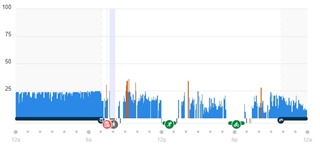A friend and I have made note of something that we think is a little strange and we can't find a good explanation for it. Perhaps someone here looked into this.
Our stress at night (zero alcohol drinking before of course) is consistently between 15 and 20, in the Fair category. There are, of course, exceptions here and there, above and below this range.
In any case, this 15-20 range is not entirely satisfactory to me, and I'm working on ways to improve this. Reason is that I believe I feel meaningfully more rested on those rare occasions when my stress factor at night is excellent, say around 10, and those where it is in my usual range.
However, for example on Sundays where we both don't exercise and chill in front of the computer, in the sofa watching TV or whatever, we can stay in the 0-10 range for extended periods of time. Myself I've seen zero before. And staying in this 0-10 range for 2-3 hours at a time, isn't uncommon. So long as I don't do anything that could disturb it like walking around, eating etc.
Has someone else here made the same observation and/or would like to speculate about the reason for this ? I don't see the potential reasons for getting higher stress factors at night vs day time.




